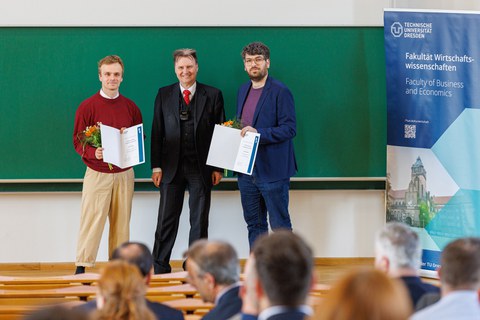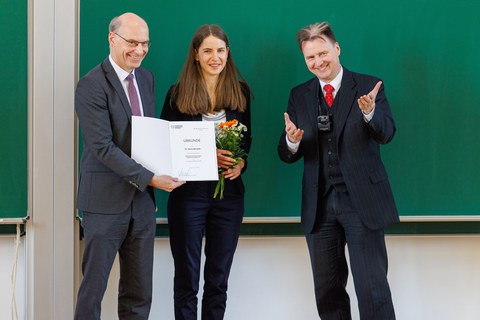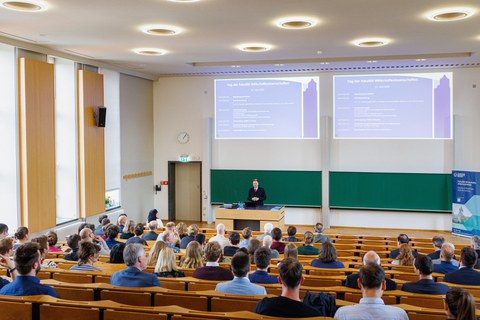Jun 19, 2025
Awards for Benedikt Zipfel und Maria Beranek on the Faculty Day
We are delighted that two members of our chair were honoured for their scientific achievements on Faculty Day on 21 May.
Benedikt Zipfel received the Professor Hilbert Publication Prize for his article “A new branch-and-cut approach for integrated planning in additive manufacturing”, which was co-authored with Felix Tamke and Leopold Kuttner. The faculty honours outstanding publications in scientific journals with this prize every year.

Benedikt Zipfel receives the Prof.-Hilbert Publication Prize
The article deals with two complex optimisation problems in additive manufacturing: the optimal placement of components on the build platform (packing problem) and the sequence planning of the resulting assemblies on the available 3D printers (machine allocation problem). The authors developed an innovative algorithm that can solve both problems in an integrated manner and significantly outperforms existing approaches in terms of solution quality and computing time. In addition, new benchmark instances were introduced for the problem, so that the contribution can also form the basis for future research. This combination of methodological originality, rigour and practical relevance contributed to the publication of the article in the European Journal of Operational Research (VHB rating: A), one of the leading journals in the field of operations research, and also convinced the selection committee for the Professor Hilbert Publication Prize.
For her dissertation on ‘Applications of Game Theory in Supply Chain Management’, Maria Beranek received the Dr Feldbausch Prize, which is awarded for outstanding dissertations in the field of economics.

Maria Beranek receives the Dr. Feldbausch Prize
In her dissertation, Maria Beranek focusses on the game- theoretic analysis of supply chains and specifically takes into account the individual interests and power relations of the actors involved. With the help of various game- theoretic models, she develops realistic and practice-orientated strategies for three central topics. One focus is on the differentiation of primary and secondary markets. Here, Maria Beranek shows how quality assurance measures and return policies can be influenced by realistic assumptions about willingness to pay and by state intervention. In the second topic area, she analyses circular economy models in which returns are uncertain and information about them is distributed asymmetrically. She shows how information advantages about return quantities can influence pricing decisions and that information asymmetries are not automatically in the manufacturer's favour. Finally, Maria Beranek deals with hydrogen supply chains, a future-oriented topic. She analyses how green hydrogen production can be promoted through taxes, subsidies and investment aid - both from the perspective of companies and the state.
The results of her research have been published in several renowned journals, including two articles in B-rated journals according to the VHB rating. This impressive scientific achievement underlines the worthiness of Maria Beranek and her dissertation for the Dr Feldbausch Award.

